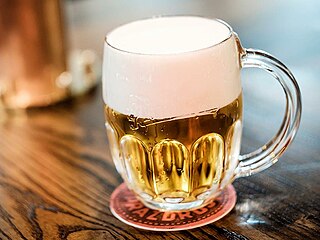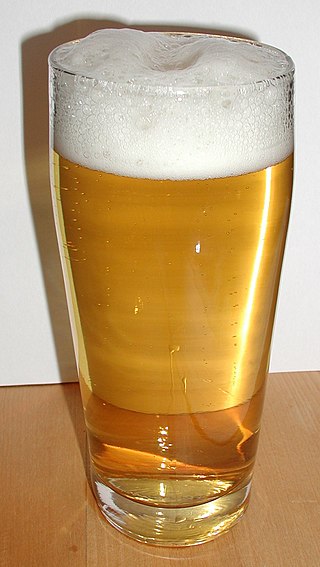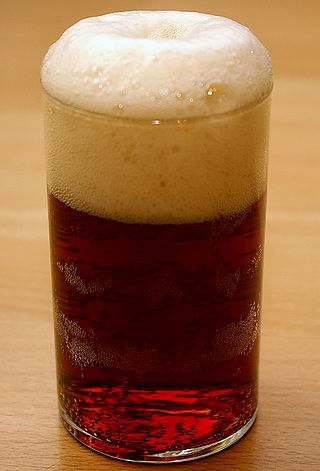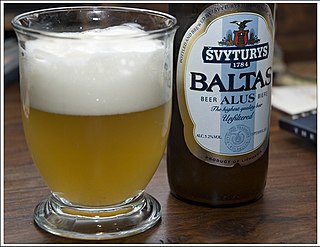
Pilsner is a type of pale lager. It takes its name from the Bohemian city of Plzeň, where the world's first pale lager was produced in 1842 by Pilsner Urquell Brewery.

Pale lager is a pale-to-golden lager beer with a well-attenuated body and a varying degree of noble hop bitterness.

Märzen or Märzenbier is a lager that originated in Bavaria, Germany. It has a medium to full body and may vary in colour from pale through amber to dark brown. It was the beer traditionally served at the Munich Oktoberfest. The geographical indication Oktoberfestbier is protected in the EU and can only be used for Märzen that is brewed in Munich.

Kölsch is a style of beer originating in Cologne (Köln), Germany. In appearance, it is bright and clear with a straw-yellow hue. Kölsch is a top-fermenting beer.

Helles or hell is a traditional German pale lager beer, produced chiefly in Southern Germany, particularly Munich. The German word hell can be translated as "bright", "light", or "pale".

Holsten Brewery is a brewing company founded in 1879 in what is now Hamburg's Altona-Nord quarter. The group now has seven breweries in Germany. Its nationally distributed premium brand is the pale lager Holsten Pilsener. The company was acquired by the Carlsberg Group in 2004.

Pilsner Urquell is a lager beer brewed at Asahi Breweries' Pilsner Urquell Brewery in Plzeň, Czech Republic. Pilsner Urquell was the world's first pale lager, and its popularity meant it was much copied, and named pils, pilsner or pilsener. It is hopped with Saaz hops, a noble hop variety that is a key element in its flavour profile, as is the use of soft water.

Altbier is a style of beer brewed in the Rhineland, especially around the city of Düsseldorf, Germany. It is a copper coloured beer whose name comes from it being top-fermented, an older method than the bottom fermentation of lagers.

Tyskie is a Polish brand of beer. Its name comes from the brewery located in Tychy. In modern day, it is brewed by the Tychy Princely Brewery, part of the Kompania Piwowarska brewery group, which was acquired by Asahi Group Holdings in 2017.

Beer is a major part of German culture. According the Reinheitsgebot, only water, hops, yeast and malt are permitted as ingredients in its production. Beers not exclusively using barley-malt, such as wheat beer, must be top-fermented.

Beer has a long history in what is now the Czech Republic, with brewing taking place in Břevnov Monastery in 993. The city of Brno had the right to brew beer from the 12th century, while Plzeň and České Budějovice, had breweries in the 13th century.

Augustiner-Bräu is a brewery in Munich, Germany, established in 1328. It is Munich's oldest independent brewery.
Plzeňský Prazdroj, a. s. is a Czech brewery which opened in 1842 in Plzeň, Bohemia. It was the first brewery to produce a pale lager, branded as Pilsner Urquell, which became so popular and was so much copied that more than two-thirds of the beer produced in the world today is pale lager, sometimes named pils, pilsner and pilsener after Pilsner Urquell. The brewery name, Pilsner Urquell, which can be roughly translated into English as "the original source at Pilsen", was adopted as a trademark in 1898. Pilsner Urquell is the largest producer and exporter of beer in the Czech Republic.

Oriental Brewery or OB is a South Korean brewery currently owned by AB InBev, and initially founded by Doosan Group.

Budweiser Budvar is a brewery in the Czech city of České Budějovice, best known for its original Budweiser or Budweiser Budvar pale lager brewed using artesian water, Moravian barley and Saaz hops. Budweiser Budvar is the fourth largest beer producer in the Czech Republic and the second largest exporter of beer abroad.

Gambrinus is a beer brewed in the Czech Republic at the Pilsner Urquell Brewery. It is one of the most popular beers in the Czech Republic. The beer is named after Gambrinus, a legendary European king known for his mythical brewing abilities. The company was founded in 1869.

Baltic Beverages Holding is a brewing company owned by Carlsberg Group. It is a significant operator in the brewing industry in the Baltic states and Ukraine.

Lager is a style of beer brewed and conditioned at low temperature. Lagers can be pale, amber, or dark. Pale lager is the most widely consumed and commercially available style of beer. The term "lager" comes from the German word for "storage", as the beer was stored before drinking, traditionally in the same cool caves in which it was fermented.

Luxembourg has a long tradition of beer brewing, dating back to at least 1300. Although there used to be more than 12 local breweries in Luxembourg in the early 1950s, this number has come down to only three big breweries remaining in the early 2010s. The three big breweries still active today are: Brasserie Nationale, producing Bofferding and Battin, Brasserie de Luxembourg, producing Diekirch and Mousel, and Brasserie Simon, producing Simon and Ourdaller.

The Aldersbach brewery is a traditional medium-sized brewery in Aldersbach, Lower Bavaria, opened in the 13th century. It produces beer types such as Dunkel, Helles, and Pilsner, plus seasonal Bock and Pale lagers. In 2016, it won awards from the Bavarian Brewers Association and the Bavarian State Beer Exhibition.




















